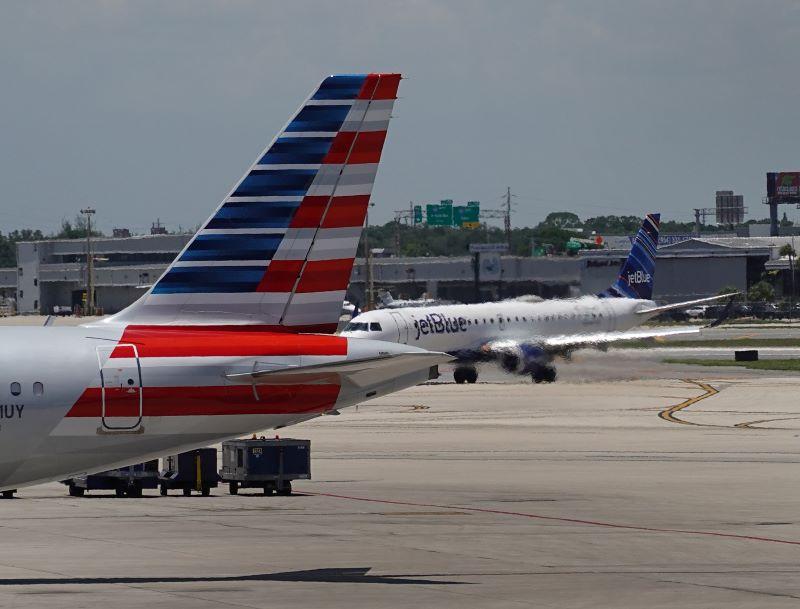
A federal judge on June 12 extended the window for American Airlines and JetBlue Airways to dissolve their northeast alliance (NEA), as he considers input on the terms of a final judgment.
The May 19 ruling ordering the cessation of the partnership in 30 days required submissions from both parties proposing the terms of a permanent injunction. Now, compliance with a final judgment would be required 21 days after a permanent injunction is issued—pushing out the June 20 deadline.
“The parties have now made the required filings, which reflect meaningful disputes regarding the terms,” a June 12 order from U.S. Judge Leo Sorokin states. “The Court takes the parties’ motions and proposals under advisement but resolves now the question of when the final injunction will take effect.”
In a June 9 filing, American and JetBlue asked the federal judge to allow the more than two-year old partnership’s codeshare and frequent flyer agreements to proceed. The carriers contend that “codesharing and frequent-flyer reciprocity are not allegedly unlawful aspects of the NEA,” calling attempts to invalidate those portions an overreach.
“These agreements are also—under both Plaintiffs’ and the Court’s analysis—common and less restrictive means of delivering consumer benefits,” the airlines’ filing states, while warning, “the harm to Defendants and their customers from being forced to exit Defendants’ existing codesharing and frequent flyer agreements is real and substantial.”
American and JetBlue also push back against plaintiff-proposed “invasive” and “burdensome” compliance monitoring, including mandatory review from the U.S. Justice Department (DOJ) prior to entering or amending any agreements, partnerships, or joint ventures with other domestic air carriers for a period of five years.
The May 19 ruling from Judge Sorokin came roughly a year and a half after DOJ sued to block the partnership, citing anticompetitive concerns.
In documents also filed June 9, the DOJ asks the court to reject the airlines’ proposed terms, an arrangement it dubs, “a new ‘NEA Lite’ on the fly.”
“After choosing to enter the most extensive partnership they contemplated—a partnership with an unprecedented level of coordination and known antitrust risk—Defendants are asking the Plaintiffs and the Court to bless a different partnership, in a matter of days, simply because it lacks some of the most brazen features of the NEA,” DOJ rebuts, stating that the two airlines “must abandon their entanglements,” while also honoring any tickets already sold under the arrangement.
It adds, “Even if the Court were inclined to take on the unreasonable task of quickly deciding the legality of a less expansive partnership incorporating parts of the NEA, the record in this case does not support the conclusion that these agreements are competitively innocuous,” pointing to an inclusion of competing nonstop routes, and what it called a competition-diminishing “spirit of partnership.”
Both sides conclude their June 9 filings by requesting that the judge adopt the terms laid out in their own proposed final judgment (PFJ).
Under the NEA, a partnership JetBlue has described as “born out of COVID,” a coordination of Boston and New York schedules has expanded to roughly 700 shared daily departures. Both carriers have maintained that the arrangement is pro-consumer, creating more competition in the U.S. Northeast. American CEO Robert Isom has previously announced an intent to appeal the ruling, reiterating a stance on the benefits of the arrangement.
In the coming months, JetBlue faces a second federal antitrust challenge, as a DOJ suit to block its planned merger with Spirit Airlines goes to court in October.

Comments